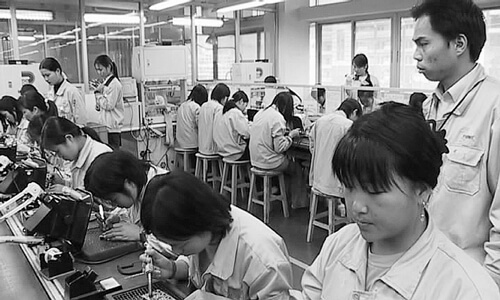Documentary eyes Nokia grappling with ethics at its Chinese factories
Workers on the production line at a factory in China that supplies parts to the Nokia Corporation, as seen in Thomas Balmes’ “A Decent Factory,” now at Film Forum.
Is it possible to take advantage of cheaper Third-World labor without taking advantage of the laborers themselves?
This predicament is the crux of the new documentary "A Decent Factory," which follows the process of Nokia’s ethics committee looking into conditions at the factories that supply the world’s largest cell phone manufacturer with parts. Nokia employs thousands of young Chinese women in a variety of factories, and this film documents company meetings in Finland and a visit to one of these factories.
Despite China’s sketchy human rights record, the world’s most populous nation has been able to attract massive amounts of capital with cheap labor. Beijing has won the bid for the 2008 Olympics, turning much of the city into one big construction site, luring even more workers to the exploding capital. China generally has experienced rapid urbanization, leaving the countryside devoid of young, strong workers, who instead flock to cities in the hopes of a brighter future.
When we think about China’s human rights abuses, the crack down on Fulan Gong and students in Tiananmen Square and the annexation of Tibet are usually the first things to come to mind. But on an everyday level, the average Chinese worker also suffers a variety of abuses, on the job in China and even when they are successful in their effort to leave the country, sometimes ending up as virtual slaves overseas.
"A Decent Factory" brings two very different cultures together, as the ethics committee members, largely Finnish and British, make their way to the Asian workplace, where the vast majority of workers are young women, often only 16. While the factory looks fairly clean, we soon learn of various abuses. Toxins are kept next to the drinking water the women use for tea; a manager has it moved to the kitchen after the cameras start rolling. Many factories, like the one we are shown, have dormitories for the women, who live eight to a room. Managers are four to a room. Everyone seems to endure appalling showers that are virtually outdoors.
Everything is geared toward productivity. A manager tells us that boys are not allowed to go up to the girls’ rooms, and that any girl who gets pregnant is sent back home. A British factory manager explains that he at times agrees to obtain contraceptives so girls could avoid this fate. The young girls have left home seeking a better life, but in the factory setting they are treated as virtual chattel. After one set of interviews, the ethics committee has to argue with a manager that the workers they met should be given extra time for lunch—they were expected to eat while being interviewed and now "the food’s all gone."
There is still plenty of work in the Chinese countryside, but much of it is not paid work, but instead simply required of young people who choose to stay on with their families.
Films made in China and those made elsewhere about the emerging economic giant have charted the effects of increased capital investment there and the resulting alienation migrants experience in the big cities. In "Ermo," a rural woman turns getting a bigger TV into her reason for living. In "Lan Yu" and "Suxhou River," and currently, in "The World," feature films have captured the challenges new urban dwellers face. Documentaries have shown the bare-bones existence most urban migrants have. Yet, in important ways, the situation must be viewed as relative—on some level, the workers are happy to be on their own, free of family constraints and making more money than they could back home. But by Western standards, being kept in barbed-wire encircled compounds and forced to sleep eight to a room and to ask permission for contraception is appalling.
It’s a good bet that Nokia would not be investigating factory conditions if it didn’t feel some need to satisfy the growing demands of the ethically-minded investment groups who have become players in the institutional financial markets.
"A Decent Factory" is a nice companion piece to "Mardi Gras," which screened at the Human Rights Watch Film Festival recently, and chronicled the conditions of Chinese workers who manufacture the beads ubiquitous in the New Orleans Fat Tuesday celebrations. "Factory" chronicles the enormous work condition disparities between East and West, but by focusing its narrative through a series of corporate meetings, the human dimensions of these issues become muted. "Mardi Gras" skillfully contrasted the lives of the workers with the frivolity of the end users in New Orleans, "A Decent Factory" is edited with considerably less imagination.
Documentaries are certainly capable of being entertaining as well as informative. Director Thomas Balmes might pay closer attention to this potential in his next outing.
gaycitynews.com



































